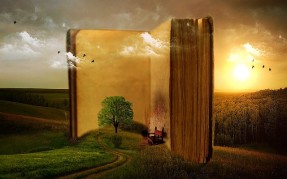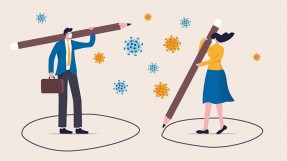Popular Categories
The Role of Youth in Achieving the Sustainable Development Goals (SDGs)
A Youth's Manifesto for a Failing System
I was born into a country of mountains and silence. Where the rivers flow louder than the promises of politicians, and dreams are often folded away like discarded paper kites. I am a child of Nepal, caught between revolution and resignation, between hope and the haunting echo of "ke garne?". They tell us we are the future, but nobody hands us the tools to build it. And still, we rise.
The Sustainable Development Goals (SDGs) are not just a checklist for the United Nations. They are a lifeline for countries like mine. Seventeen goals. Seventeen prayers. End poverty. Ensure education. Save the planet. It sounds beautiful in theory. But theory doesn’t feed the hungry in Humla. It doesn’t build libraries in Rolpa. It doesn’t stop my friend from booking a one-way ticket to Australia, eyes heavy with unspoken grief, not of leaving home, but of being forced to. Forced by a system that teaches us to dream, but not to stay.
Our generation does not inherit the Earth. We inherit debt, broken promises, and the trauma of our parents who survived civil war only to witness a slow decay disguised as peace. And yet, we are the most connected, the most awakened. We are Greta with her cardboard sign. We are the student protester in Maitighar holding the Constitution in one hand and a shattered dream in the other. We are TikTok voices, Instagram activists, community builders with hashtags that carry more conviction than political speeches.
We are more than the statistics you toss into reports. 40% of Nepal's population is under 25. That’s not a number. That’s power. That’s potential. That’s a battalion of minds waiting to shape a new world. But we are asked to wait. To be patient. To settle. We are told that change takes time. But we are tired of time being a luxury only the privileged can afford.
Education? We yearn to reach underfunded schools where children sit on cold floors, sharing textbooks that have outlived governments. We are told to memorize, not question. But we do question. We question why a degree means nothing if you don't have connections. We question why corruption sits in Parliament in tailored suits while the youth sit for Loksewa exams again and again, as if hard work alone can pierce the glass ceiling of nepotism.
In Jumla, a girl wakes up at 4 a.m. to walk three hours to school. In Kathmandu, a student studies under candlelight during power cuts. Yet both carry a fire in their eyes brighter than any bulb. We learn to survive in systems not designed for us. And we learn to fight for those who cannot. We know that quality education is the bedrock of equality, of opportunity, and of innovation and we will fight for a system that uplifts, not excludes.
Climate change? We feel it in the erratic monsoon. In the landslides burying entire villages. In the heatwaves that kill crops and futures. In the floods that rob homes and hopes. Our mountains melt, our rivers choke, and yet, who listens when the youth speak? Who funds our ideas? Who includes us in the conversation?
Youth in Chitwan are building bamboo water filters. In Mustang, local teenagers are documenting glacier retreats with their phones. We are collecting trash where tourists won’t. We are the custodians of this land even when the system forgets us. We understand that climate action is not just about planting trees, it is about restoring dignity to communities erased by environmental injustice.
Gender equality? We are done waiting. We fight not because it is fashionable, but because we see our sisters drop out of school during menstruation. We see our mothers silenced. We see women judged more for the length of their skirts than the strength of their minds. The youth are dismantling patriarchy, one conversation, one poem, one protest at a time.
We don’t want token inclusion. We want real power for every woman, every queer voice, every unheard identity that deserves to be seen, heard, and respected. The fifth SDG isn’t just about gender, it’s about justice.
Health? We held up oxygen cylinders when our hospitals ran out. We became volunteers when governments disappeared. Mental health still whispers in shadows, but we are the ones speaking up. We are creating safe spaces, peer circles, and opening the conversation our elders were too ashamed to begin.
We know that “health for all” must mean reaching both the body and the mind. We want clinics in Karnali, counselors in classrooms, and compassion in policy. We are no longer ashamed to say we are struggling—and no one should be.
Innovation? We are not waiting for funding. We are designing apps, starting eco-businesses, and launching YouTube tutorials from bedrooms with cracked ceilings. We know the system doesn’t serve us, so we build new ones. We teach ourselves. We teach each other. We hack the future with whatever scraps we have.
We need decent work—not just survival jobs abroad, but dignified opportunities here. We believe SDG 8—Decent Work and Economic Growth—is not about numbers. It’s about faces, futures, and the freedom to stay.
Clean Energy? We believe solar panels on rooftops can light up the dreams of a village. We want biogas in farms, windmills in hills, and innovation in hands that are told to do nothing but migrate. We know Nepal has the potential for clean, renewable futures, if only we were invested in.
And yet, despite the failures of systems meant to protect us, we persist. We create community gardens in schoolyards. We launch startups that upcycle waste. We teach coding to children in remote districts. We organize blood donation drives and mental health workshops. We don’t wait for saviors. We become them.
We fight for clean water not because it is a campaign goal, but because we have tasted the bitterness of disease. We champion peace not from textbooks, but from knowing what it's like to lose friends to foreign wars and foreign dreams. We are those who light candles in Bhaktapur when the nation mourns. We are those who clean the Bagmati because no one else will.
We are not just participants of change. We are the authors of it. Our words are protests. Our actions, revolutions. The SDGs are not distant goals , they are our lived realities. And if the system will not let us in, we will break the walls. Not in anger, but in aching love for a homeland that deserves more than resignation.
We will not all flee abroad. Some of us will stay. And fight. And write. And teach. And build. Because this land surely is flawed and deeply wounded but still it belongs to us.
We carry within us the fire of Janakpur poets, the resilience of Gorkhas, the grace of the Himalayas. We are a generation that dares to hope, even when the world tells us not to. We are youth with cracked phones, second-hand books, sleepless nights and an unshakable belief that things can be better.
We are reshaping politics not through votes alone, but through voices. We are the ones livestreaming protests, translating policies on Instagram, building cooperatives in the hills, and building bridges where governments build nothing.
Nepal doesn’t need saving. It needs unleashing. It needs young farmers who return to the soil with dignity. It needs teachers who teach children to think, not obey. It needs artists who sing of freedom, writers who write with fire, and engineers who dare to build what others said was impossible.
And the youth? We are all of that. We are the earthquake and the aftershock. The storm and the rebuild. The lost and the found. The pain and the poetry.
We are every village without Wi-Fi still dreaming of code. Every girl reading by candlelight who will become a leader. Every boy who chooses to plant trees instead of chase passports. Every student who dares to believe their country is worth more than its corruption.
We are coming.
For every SDG.
For every stolen dream.
For every youth who refused to give up.
And we are not leaving.
— Chahana Parajuli










Leave a Comment: